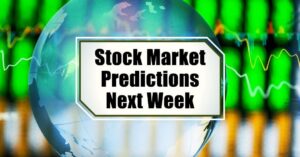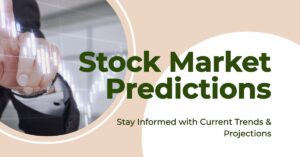US Stocks: Up or Down Next Week? The stock market seems to be regaining its footing after a choppy start to May 2024. As we set sail for the week of May 13th, investors are attentively waiting for key economic data that could send ripples through the market. Let's dive deeper into the upcoming events and how they might impact your investment strategy. Here are the possible stock market predictions for the next week.
Inflation in Focus: The CPI Report Takes Center Stage
The undisputed captain of the week's economic releases is the Consumer Price Index (CPI) report, scheduled for release on Wednesday. This report acts as a compass for inflation, a critical measure that heavily influences the Federal Reserve's monetary policy decisions.
- Gauging Inflation's Trajectory: Economists are predicting a 0.4% increase in CPI month-over-month and a 3.4% year-over-year increase. A lower-than-expected number could be interpreted as a sign of diminishing inflationary pressures, potentially steering the market towards calmer waters and a potential rally. However, a higher-than-expected number could reignite concerns about persistent inflation, leading to choppier seas and a potential market pullback.
- The Fed Factor: The Federal Reserve has indicated it might ease its foot on the interest rate hike pedal if inflation shows signs of receding. A positive CPI report could solidify this stance, boosting investor confidence and potentially propelling stock prices higher.
Beyond the CPI: Additional Currents Shaping the Stock Market
While the CPI report is the main event, several other factors will also influence the market's direction:
- Producer Price Index (PPI): Released on Tuesday, the PPI measures inflation at the wholesale level. A lower PPI could indicate easing price pressures further down the supply chain, potentially mirroring a positive CPI report.
- Federal Reserve Chair's Speech: Any comments from Jerome Powell, the Fed Chair, regarding the economic outlook and monetary policy could trigger market reactions. Investors will be parsing his words for clues about the Fed's future actions.
- Global Cues: Performance of major markets worldwide, particularly Europe and Asia, can influence investor sentiment in the US market. If major markets overseas experience significant gains or losses, it could create a ripple effect impacting US stocks.
- Earnings Season's Lingering Effects: Remember, the market is still finding its footing after recent volatility. Earnings reports from major companies that trickled in during the previous week can continue to cause stock-specific price movements. Pay attention to earnings reports from companies you hold or are considering investing in.
Charting Your Course: Strategies for Navigating Volatile Waters
So, how can you navigate these potentially volatile waters? Here are some tips to keep your investment strategy on course:
- Stay Informed: Remain vigilant and closely monitor the economic data releases and Fed-related news. This will help you stay abreast of any developments that could impact the market.
- Embrace Diversification: A diversified portfolio acts as a life raft during turbulent times. Spreading your investments across different asset classes and sectors helps mitigate risk and smooth out market fluctuations.
- Long-Term Vision: Don't make impulsive decisions based on short-term market movements. Remember, your investment goals are likely long-term. Focus on companies with solid fundamentals and a proven track record, and avoid making knee-jerk reactions based on daily market noise.
The Final Verdict
The week ahead presents a crucial test for the US stock market. While a positive CPI report could lead to a bullish run, it's essential to manage expectations and stay informed. Remember, long-term investment strategies focused on strong companies are more likely to weather market ups and downs, just like a well-built ship can navigate even the stormiest seas.
ALSO READ:
Stock Market Forecast Next 6 Months
Next Stock Market Crash Prediction: Is a Crash Coming Soon?
65% Stock Market Crash: Top Economists Share Scary Predictions for 2024
Stock Market Crash: 30% Correction Predicted by Top Forecaster


